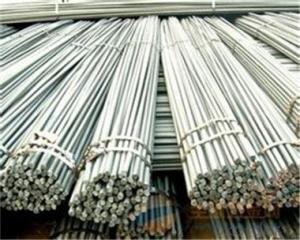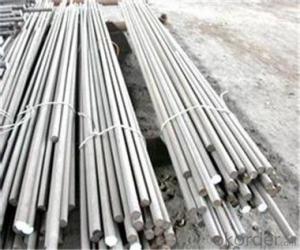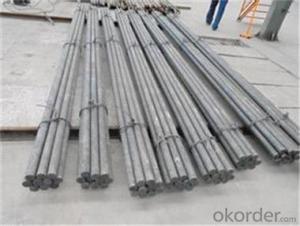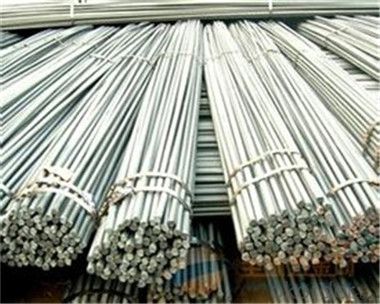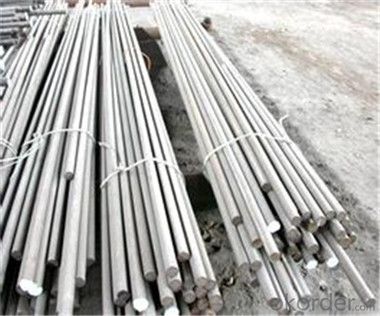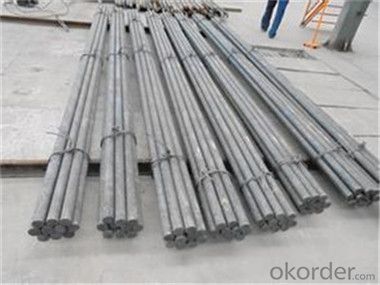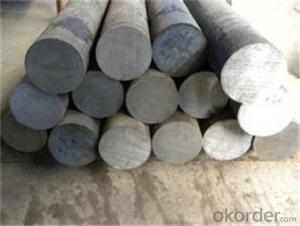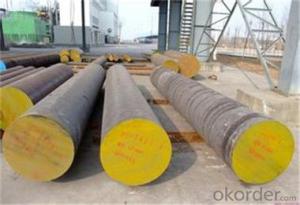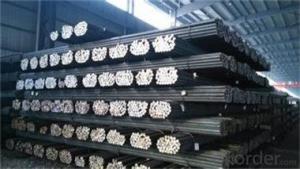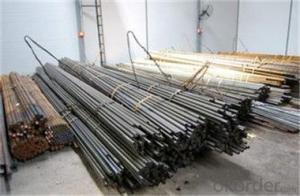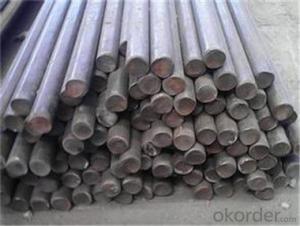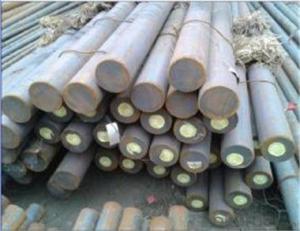Hot Rolled 12mm Steel Rod Price Steel Round Bar from China
- Loading Port:
- Tianjin
- Payment Terms:
- TT OR LC
- Min Order Qty:
- 12 m.t.
- Supply Capability:
- 2000000 m.t./month
OKorder Service Pledge
OKorder Financial Service
You Might Also Like
Description of steel round bar:
(1) Thickness of not more than 2MM sheet, efficient blanking die, punch die and pressure die etc.
(2) All kinds of scissors, inserts, woodworking blade.
(3) Thread rolling die and wear-resistant slider.
Festures of steel round bar:
4340 Forged Round Steel Bar
1.Dia 80-800mm Length:2000-13000mm or as required
2.Technique:Forged
Mild Steel Round Bar is used for making security grills, screens, Construction and Machine Manufacture.Stainless steel bar is widely used in Architecture,Machine Manufacture,Power Station,Electric Equipment and Factory,Oil and Chemical Industry,Food and Medical Industry,
City Decoration Industry
Specifications of steel round bar:
Round bar | Diameter(mm) | Length (mm) | |
10~800 | 2000~5800 | ||
plate/sheet | Thickness(mm) | Width (mm) | Length (mm) |
10~800 | 80~2300 | 2000~5800
|
Images of coffee steel round bar:
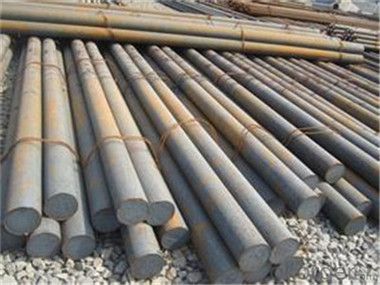
FAQ:
1. What is your package?
Packing situation: standard seaworthy packing or as customer required.
2. How long is the lead time?
Delivery time: 45 days after order confirmed.
3. What payment term do you accept?
Payment: T/T or L/C at sight.
- Q: Can steel round bars be used in the agricultural industry?
- Yes, steel round bars can be used in the agricultural industry. They have a wide range of applications in this sector, such as constructing fences, gates, and livestock enclosures. Steel round bars are also commonly used as support and reinforcement in structures like barns, sheds, and agricultural machinery. Their high strength and durability make them ideal for withstanding the harsh conditions and heavy loads typically found in agricultural settings. Additionally, steel round bars can be further processed and fabricated into various agricultural tools and equipment, including hitches, plows, and cultivators. Overall, steel round bars are a versatile and reliable material that can effectively meet the demands of the agricultural industry.
- Q: What is the cost of steel round bars?
- The price of steel round bars may differ based on various factors, including the steel grade, bar size, and purchase quantity. Typically, market conditions play a significant role in determining the price, leading to fluctuations over time. To obtain the most accurate and current pricing information, it is advisable to reach out to local steel suppliers or explore online platforms specializing in steel products. Moreover, it is essential to consider additional factors like transportation and handling expenses, as they can impact the ultimate cost.
- Q: What are the advantages of using mild steel round bars?
- Using mild steel round bars in various applications offers several advantages. To begin with, mild steel round bars exhibit exceptional strength and durability. They have the capacity to withstand high levels of stress and pressure, rendering them suitable for use in construction, manufacturing, and engineering ventures. The robustness of mild steel round bars ensures that they do not readily deform or fracture under heavy loads, providing a dependable and long-lasting solution. Furthermore, mild steel round bars possess favorable weldability. They can be easily joined or affixed to other materials through welding, granting them versatility across different applications. This allows for effortless customization and flexibility in design, as the bars can be shaped and connected to form intricate structures or components. In addition, mild steel round bars feature a low carbon content, making them more cost-effective in comparison to alternative steel types. They are readily available and affordable, making them a popular choice within various industries. Moreover, mild steel round bars exhibit excellent machinability. They can be effortlessly cut, drilled, and shaped using common machining techniques, facilitating easy fabrication and customization. This renders them suitable for a wide array of applications, ranging from construction to automotive components. Lastly, mild steel round bars offer commendable corrosion resistance. Although they may not possess the same level of corrosion resistance as stainless steel, they still provide adequate protection against rust and other forms of corrosion. This renders them suitable for outdoor applications or environments with high levels of humidity or exposure to moisture. In conclusion, the advantages of utilizing mild steel round bars include their exceptional strength and durability, favorable weldability, cost-effectiveness, machinability, and corrosion resistance. These factors make them a reliable and versatile choice for various industrial and construction applications.
- Q: Are steel round bars suitable for bridge construction applications?
- Steel round bars are widely utilized in the construction of bridges. They possess numerous benefits for this purpose, such as their remarkable strength, durability, and versatility. These bars have the ability to withstand heavy loads and provide the essential structural support required for bridges. Furthermore, their fabrication and welding processes are easily manageable, resulting in efficient construction procedures. Incorporating steel round bars into bridge construction ensures the resistance of bridges to corrosion, a crucial aspect in environments exposed to moisture or severe weather conditions. Overall, steel round bars are an ideal and frequently employed material in bridge construction due to their strength, durability, versatility, and corrosion resistance.
- Q: What are the different types of steel round bar surface finishes for improved aesthetics?
- Enhancing the aesthetic appeal of steel round bars can be achieved through various types of surface finishes. The selection of these finishes is typically based on the desired appearance and function of the steel. The following are some commonly used surface finishes for steel round bars: 1. Polished: Achieved through a series of abrasive processes, this finish results in a smooth and reflective surface. It is often utilized in applications that prioritize visual appeal, such as architectural structures or decorative pieces. 2. Brushed: This finish is accomplished by brushing the steel surface with a wire brush or abrasive pad, creating a textured look. It offers a more contemporary and subdued appearance, commonly seen in modern architectural designs or furniture. 3. Satin: Similar to brushed, this finish possesses a finer texture, producing a smooth and matte appearance. It is favored for applications that require a sophisticated and elegant aesthetic, such as luxury fixtures or appliances. 4. Hammered: This finish involves creating small dents or dimples on the steel surface, resulting in a textured and rustic appearance. It is frequently utilized in applications that necessitate a unique and artistic look, such as handrails or decorative accents. 5. Etched: Achieved through chemical treatment of the steel surface, this finish allows for intricate and detailed patterns or designs. It is popular for applications that require personalized or branded elements, such as signage or logos. 6. Powder-coated: This finish entails applying a layer of powdered paint to the steel surface, which is then baked to create a durable and vibrant coating. It offers a wide range of color options and is commonly used in applications that require both decorative and long-lasting finishes, such as outdoor furniture or architectural elements. Ultimately, the choice of steel round bar surface finish depends on the desired aesthetic outcome and the specific requirements of the application. Different finishes can enhance the visual appeal of the steel, making it suitable for a wide range of industries and design purposes.
- Q: Can steel round bars be used in the manufacturing of couplings?
- Yes, steel round bars can be used in the manufacturing of couplings. Steel round bars are commonly used in various industrial applications due to their strength, durability, and versatility. Couplings are mechanical devices that connect two shafts together in order to transmit power or allow for the misalignment of the shafts. Steel round bars can be machined, formed, or welded to create different types of couplings, such as rigid couplings, flexible couplings, or universal couplings. The use of steel round bars in manufacturing couplings ensures that the couplings have high tensile strength and can withstand heavy loads and torque. Additionally, steel round bars can be heat-treated to enhance their mechanical properties, making them suitable for different operating conditions and environments. Therefore, steel round bars are a popular choice for the manufacturing of couplings.
- Q: Can steel round bars be hardened and tempered?
- Yes, steel round bars can be hardened and tempered. This process involves heating the steel to a specific temperature, followed by rapid cooling to increase its hardness. Subsequently, the steel is reheated to a lower temperature and slowly cooled to improve its toughness and durability.
- Q: What are the different types of steel round bar alloys for improved machinability?
- There are several types of steel round bar alloys that are specifically designed to improve machinability. These alloys are chosen for their ability to be easily shaped, cut, and drilled, which is crucial in various machining applications. Some of the commonly used steel round bar alloys for improved machinability include: 1. 12L14 Steel: This alloy contains added lead, which enhances its machinability. The presence of lead lubricates the cutting tool, reduces friction, and improves chip formation during the machining process. 2. 1215 Steel: Similar to 12L14, 1215 steel also contains added lead, which provides excellent machinability. This alloy is known for its high cutting speeds, smooth surface finish, and improved chip control. 3. 4140 Steel: Although not specifically designed for machinability, 4140 steel is known for its excellent overall machining properties. With proper heat treatment, this alloy offers good strength, toughness, and wear resistance while still maintaining a reasonable level of machinability. 4. 1018 Steel: This low carbon steel alloy is widely used for its excellent machinability. It is easy to cut, drill, and shape, making it suitable for a variety of machining operations. However, it may have lower strength compared to some other alloys. 5. 8620 Steel: This alloy is specifically designed for case hardening, but it also offers good machinability. 8620 steel can be easily machined, providing high surface finish and dimensional accuracy. 6. 416 Stainless Steel: This stainless steel alloy provides good machinability due to its sulfur content. It is used in applications where corrosion resistance is required along with improved machinability. These are just a few examples of steel round bar alloys that are chosen for their enhanced machinability. The selection of the appropriate alloy depends on the specific machining requirements and the desired properties in the final product.
- Q: What is the difference between a turned and a ground steel round bar?
- A turned steel round bar is a cylindrical steel rod that has been machined using a lathe to achieve a smooth and precise finish. This process removes material from the surface of the bar, resulting in a dimensional accuracy and a polished appearance. On the other hand, a ground steel round bar is also a cylindrical steel rod, but it undergoes a different machining process called grinding. Grinding involves using an abrasive wheel or belt to remove material from the bar's surface, resulting in a more precise diameter and a smoother finish compared to turning. In summary, the main difference between turned and ground steel round bars lies in the machining process used. Turning removes material through a lathe, while grinding involves an abrasive process for a more accurate and polished result.
- Q: What are the advantages of using copper-alloy steel round bars?
- There are several advantages to using copper-alloy steel round bars. Firstly, the copper content in the alloy enhances the material's corrosion resistance, making it suitable for applications in harsh environments or exposed to moisture. Secondly, the combination of copper and steel results in improved strength and durability, allowing the round bars to withstand heavy loads and high-stress conditions. Additionally, copper-alloy steel round bars offer excellent thermal conductivity, making them ideal for applications where heat transfer is necessary. Lastly, copper-alloy steel round bars are relatively easy to machine and fabricate, providing versatility in various industries such as construction, manufacturing, and engineering.
Send your message to us
Hot Rolled 12mm Steel Rod Price Steel Round Bar from China
- Loading Port:
- Tianjin
- Payment Terms:
- TT OR LC
- Min Order Qty:
- 12 m.t.
- Supply Capability:
- 2000000 m.t./month
OKorder Service Pledge
OKorder Financial Service
Similar products
Hot products
Hot Searches
